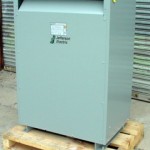Old Obsolete Good Scrap Transformers
MIDWEST was asked what we did with perfectly good obsolete or old used transformers. Bit of an oxymoron since obsolete might be understood to mean no longer any good. But the intent of the question was obvious. Transformers that are too old to be sold in the used transformer market might be maintained in MIDWEST’s pool of rental, temporary, and emergency transformers or they are just scrapped. Typically a rental transformer is just for temporary use. But we have had many transformers on rental for over a year. Especially larger Mva transformers. We have a few we didn’t scrap out but kept around solely because of the special voltages or size or physical configuration, to be used in those rare occasions when a manufacturing company, for example, is in trouble with delivery of a special replacement transformer. This usually happens when they had a non typical transformer suddenly fail. The difference between these special temporary transformers, which we sometimes call cling-ons, and our rental transformers is that we’d really like to get rid of the cling-ons. But about every time we think we’ll scrap out an obsolete old unit, we get a desperate call and it is the only thing that will work and the only one the customer can find. So it is resuscitated again and lives on. We do have fewer of these than ten years ago. We just scrapped out a 2000 Kva oil filled power transformer, 13,200 volts to a variable secondary of 120 volts to 600 volts. Weighed 18,000 pounds. A big old power transformer, specially built for a transformer power lab about 60 years ago. We finally got rid of it because we never rented it in two decades; And we did not have a good biography on the unit, although all our test results were good. The install cost as a rental, emergency, or temporary transformer would have been potentially huge because of the oversize and weight due to the many voltage taps. A potential customer would only need one functional voltage and would be paying a premium for a monster oil filled power transformer when they probably could find a unit with their specific voltage. Plus MIDWEST can not rent a transformer we no longer have full confidence in, even during an emergency. In the last month we designated over ten transformers to the scrap heap. Mainly because of a lack of full confidence in their reliability, even though many of them had good test results. MIDWEST knows electrical tests, on used oil filled and dry type power transformers, are not a perfect indication of the condition of the transformers. So MIDWEST looks for reasons to get rid of the old and the cling-ons.
